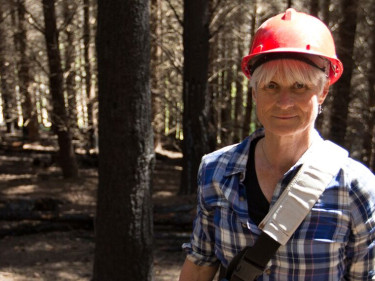Farmers and rural businesses need to be alert to the risk of fire on their land whether it is prescribed burning (read Prescribed Burning Guide), using chainsaws, or other machinery. Including fire protection in business plans can help farmers identify and manage the risks.
Farm and Land Operations
Fires can start from the smallest spark. So you need to be very careful when using machinery during extreme fire danger periods.
Fires can start easily from, for example, slashers or mowers hitting stones, or exhausts when driving through or parking in stubble or long, dry grass. In extreme fire danger days, it is important to:
- stop using welders, chainsaws, slashers and reducing some tractor operations
- ensure diesel trucks with exhausts higher than the cab have spark-arrester shields fixed to the exhaust when carting hay
- harvester operators are aware of the conditions outside their air-conditioned cabs
- pay special attention to checking your machinery's bearings and moving parts
- carry appropriate fire extinguishers, shovels, or knapsack sprayers during high-fire danger periods
- to help you keep track of the fire danger and weather conditions within your area, use the fire weather website.
For more information read our Farm Fire Safe document, to help put fire safety into your farm business plan.
Prescribed Burn-Offs
Fire is an efficient and economical way of clearing land on farms. It is also important it is contained within the area to be burnt and does not present any danger to life, neighbouring property or the environment. Farmers and other rural landowners can ensure the burn is effective and safe by:
- knowing their legal requirements
- ensuring the burn is planned and the land prepared
- understanding burning techniques
- recognising safety issues. To help you plan your burn
- talk with your local Rural Fire Officer or Fire and Emergency NZ
- Read our landowner's guide to land clearing by prescribed burning
- or visit Worksafe NZ's website - Safer Farms
Farm Business Planning
An up-to-date business plan documents the big picture of where you want your business and your family to be in the future. It also identifies short- and long-term goals to achieving your plan.
How you manage risk is also an important part of a business plan and adds value and reliability to your business.
When developing or updating your farm business plan, make sure you include a plan to protect your home, property, and assets from the risk of fire.
Assess the Risk of Fire to your Farm
Do you know the risk from fire to your farm? Our questionnaire will help you assess what your risk is and identify the priorities for your business plan.
When assessing the risk of fire to your farm, you will need to consider the risks:
- Inside your home
- To your home from vegetation fire
- To your farm buildings and machinery
- During farm operations
- During controlled burn offs
Make an Action Plan
Use the results of the questionnaire to check what you need to action in the future. Include in your business plan the actions you already have in place and the ones you will put in place.
Remember to schedule a timeframe for achieving them, whether they are in the short or long term.
Also, include the financial cost into your plan.
Wire Strike - A Guide for Farmers
Low-level spraying is a frequent occurrence and farmers and agricultural pilots need to work together to stay safe around wires. That’s the message from Worksafe and the Civil Aviation Authority who have developed a fact sheet on how to prevent wire strike – a cause of many agricultural pilot accidents and deaths. Read our Fact Sheet.
Power lines carry electricity essential to the daily running of the farm. Electricity should always be treated with respect and care, especially when working near power lines. Read our Factsheet.














